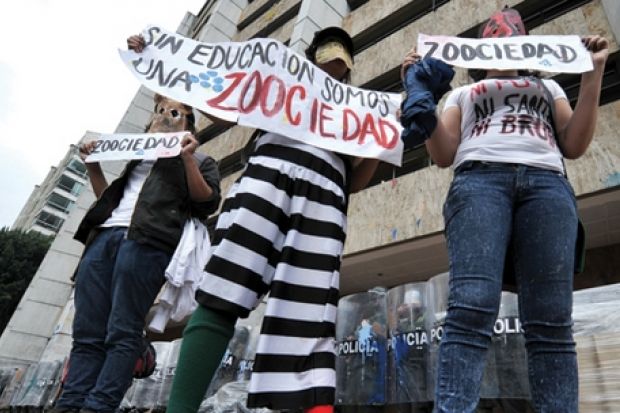In November, 600,000 Colombian students walked out of lectures in protest at what they saw as the increasing privatisation of higher education in the country.
Their action prompted the government to back down from plans to reform Law 30, enacted in 1992, which among other things accords higher education in the country the status of a public service.
According to Andy Higginbottom, principal lecturer in international politics and human rights at Kingston University, the reforms would have "effectively (privatised) the remaining public sector aspects of higher education" in Colombia.
But having noted the students' campaign, which was supported by a number of academics, the government has now relaxed its stance and will enter into talks with the Colombian public, including students and educators.
"This year, the national government wants to promote a national dialogue about the fundamental issues of state policy to allow the consolidation of a sustainable higher education system that ensures equitable access to quality education," said Javier Botero Alvarez, vice-minister in Colombia's Ministry of Education.
He added that the government aimed to create a higher education system that facilitated the generation of knowledge, technology and innovation.
Colombians can now contribute to the reform process by posting their views on a consultation website. President Juan Manuel Santos' government hopes that this will address a crucial grievance behind the walkout: a feeling among protesters that the reform process was undemocratic as it lacked public discussion - particularly with students.
The principles that are now up for debate are: the requirement that all Colombians should have equal access to higher education no matter their background; the assurance of education quality and relevance; regional equity; and financial and institutional stability.
These issues were also on the agenda in February when 32 university presidents met at the National University of Colombia's Medellin campus to discuss how they could help to draft a reform bill that would focus primarily on students.
Bernardo Rivera Sanchez, executive director of the Colombian Association of Universities (ASCUN), said: "All studies in Colombia, and most notably those undertaken by ASCUN during the past year, indicate that the social return on investment in higher education is much higher at 46 per cent than the private return of 18 per cent."
With this in mind, the argument is that the state should consider higher education as a long-term national investment, not as a short-term drain on its finances.
Yet pressure group Justice for Colombia said that public funding for universities had dropped from 84 per cent to 51 per cent of the sector's budget.
In spite of the government's offer of dialogue, the group accuses President Santos of fudging the difference between education as a service and as a human right.
The government's decision to put on hold its controversial reform programme and engage its critics suggests that it is listening to its opponents. But students and academics sympathetic to opposition concerns are withholding judgement until they find out what happens once the consultation process has concluded.
Register to continue
Why register?
- Registration is free and only takes a moment
- Once registered, you can read 3 articles a month
- Sign up for our newsletter
Subscribe
Or subscribe for unlimited access to:
- Unlimited access to news, views, insights & reviews
- Digital editions
- Digital access to THE’s university and college rankings analysis
Already registered or a current subscriber? Login
